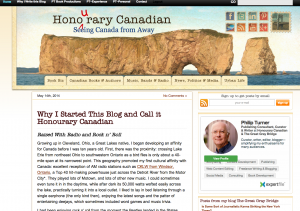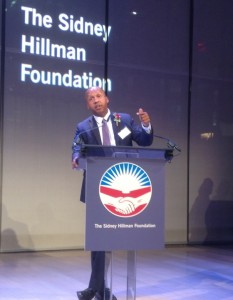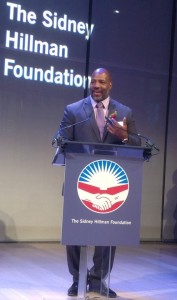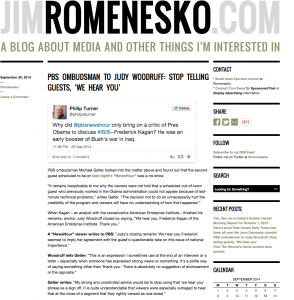A Righteous Celebration of #SocialJustice and #AdvocacyJournalism at the Annual Hillman Prizes
/0 Comments/in Media, Blogging, Internet, News, Politics, History & Media /by Philip TurnerAn Unrepentant Literary Forger’s Infamous Career
/0 Comments/in Book Biz, Media, Blogging, Internet /by Philip Turner
I’m glad my Facebook post above on prolific forger Lee Israel drew appreciation from Fb friend Joseph Mackin, who shared it on his blog 2paragraphs. This is the link to his nicely presented reposting which looks like this:
In Which My Critique of PBS NewsHour for Letting Architect of Iraq War Spew Invective at President Obama Gets Wide Coverage
/0 Comments/in Media, Blogging, Internet /by Philip TurnerFor a media hound like me, Jim Romenesko’s media news website is a regular must-read. Imagine the satisfaction I felt today when I saw he’d done a post yesterday that used a tweet of mine from Monday night—about a shockingly one-sided PBS Newshour segment about ISIS and President Obama—as the jumping-off point for his piece. In the segment, Judy Woodruff interviewed Frederick Kagan, an early proponent of invading Iraq, who slammed President Obama repeatedly for his supposed failures with regard to Iraq, including the bogus canard that he failed to leave US troops in the country, when it was the Bush administration that negotiated the terms under which US forces left. This and many other false and tendentious claims were made by Kagan of the American Enterprise Institute, all of which went unchallenged by interviewer Judy Woodruff. Worse, at the end of the segment she said, “We hear you,” as if lending her stamp of approval to Kagan’s screed. I was appalled at this egregious example of biased coverage and tweeted to that effect. Today, Romenesko ran a post picking up my tweet, and for which he interviewed PBS ombudsman Michael Getler, who’s also covered this episode. Getler agreed that the segment was an example of terrible and one-sided coverage. Getler learned that the program had planned for another guest to be on opposite Kagan, but that they couldn’t come on, after all. The NewsHour never told viewers this on-air. Below is a screenshot to Romenesko’s post, and here’s a link to it.
Hearing Harvey Araton Talk about “Cold Type”
/0 Comments/in Books & Writing, Media, Blogging, Internet, Urban Life & New York City /by Philip Turner
I really enjoyed reading Cold Type after getting a copy at BEA in early summer, and it was fun meeting Araton last night at Book Court. It’s like a Tom Wolfe novel, in that it’s set against a churning social backdrop, the NYC that was emerging in 1994, just as the Internet was about to change journalism, but it has a lot more heart than Wolfe, with characters whose fates you really ponder, even the bad guys. Araton’s been writing about sports, in the NY Times and in books for years, but this is his first novel and it’s really good. I wrote about it on this blog June 14.
Taking a Page from Honourary Canadian
/0 Comments/in Canada, Honourary Canadian, Media, Blogging, Internet, Personal History, Family, Friends, Education, Travels, Philip Turner's Books & Writing /by Philip Turner As readers of this blog may have noticed, I started a second blog in 2013, called Honourary Canadian: Seeing Canada From Away. After starting this blog in 2011, I was often posting about Canada, and a couple years in, decided to start a second site devoted to Canadian topics, where I’d offer my views of Canada for Canadians and others interested in the country. I aspire to the perspective and the work of Alistair Cooke, who broadcast and wrote knowledgeably and sensitively about America, after moving to the US from England. Like this site, at the new blog I write about Canadian books, publishing, live music, media, and politics, with the cross-cultural perspective of a respectful outsider. I’ve been sharing HC links here from time to time and integrating the two sites one with another, for instance setting up a feed so the latest posts from each site are readily visible and linked to on the other. The two blogs are sort of like siblings, with this one the older brother.
As readers of this blog may have noticed, I started a second blog in 2013, called Honourary Canadian: Seeing Canada From Away. After starting this blog in 2011, I was often posting about Canada, and a couple years in, decided to start a second site devoted to Canadian topics, where I’d offer my views of Canada for Canadians and others interested in the country. I aspire to the perspective and the work of Alistair Cooke, who broadcast and wrote knowledgeably and sensitively about America, after moving to the US from England. Like this site, at the new blog I write about Canadian books, publishing, live music, media, and politics, with the cross-cultural perspective of a respectful outsider. I’ve been sharing HC links here from time to time and integrating the two sites one with another, for instance setting up a feed so the latest posts from each site are readily visible and linked to on the other. The two blogs are sort of like siblings, with this one the older brother.
I’m posting here today to let Great Gray Bridge readers know I recently published a new entry at Honourary Canadian called Why I Started This Blog and Call It Honourary Canadian, which explores my lifelong interest in the neighbor to the north. I invite you to read it. It’s a memoiristic piece that chronicles many trips I’ve made in Canada since childhood, beginning with Expo ’67 when I was just twelve years old; authors whose books I’ve read and published; bands I’ve seen live and become friendly with; and reflections on differences between the US and Canada, and the media in both countries. Along with the essay, I’ve included dozens of scenic photographs, book covers, band photos, and scans of letters I received from Canadian novelist Robertson Davies, with whom I had a lengthy correspondence when I ran Undercover Books in the 1980s.
At the top of this entry is a shot of that new post, which will give you a sense of what the new site looks like if you’ve not visited yet. Just as I found a visual touchstone for this blog from a scenic landmark—the George Washington Bridge, aka the Great Gray Bridge, and the little red lighthouse—I found visual inspiration for the new site in a true wonder of the world, the majestic Percé Rock (aka le rocher percé or ‘pierced rock’), a huge rock face on eastern Quebec’s Gaspé Peninsula, a veritable lobster tail jutting in to the Gulf of St. Lawrence where it meets the Atlantic Ocean. Below is a pic of what that post looks like. If you enjoy awe-inspiring scenery, I recommend you check out the whole post, which includes many photos I took during a visit there in 1988. In fact, I invite you to visit Honourary Canadian, and have a look around. 
Is Some Sort of Journalistic Karma Striking the New York Times?
/0 Comments/in Media, Blogging, Internet /by Philip TurnerIronic–Abramson tries recruiting @Guardian‘s Gibson for digital at @NYTimes. After it falls thru @Guardian hires the Times’ digital maven.
— Philip Turner (@philipsturner) May 19, 2014
To expand on my tweet, it is Aron Pilhofer that’s leaving the New York Times and joining the Guardian now as Executive Editor for digital. As is clear from the Guardian‘s announcement, he was recruited by Janine Gibson, beginning last March, she points out, to make clear it was underway before the recent unpleasantness. Gibson has found herself an inadvertent participant in the Jill Abramson firing debacle, as she had been in the process of being courted by Abramson, and other Times bigs including Dean Baquet, now the top editorial exec at the Times replacing Abramson. A continuing disagreement among the principals in the imbroglio is what Abramson said to Baquet about the likely level of Gibson’s role, if she came to the Times. Baquet says Abramson never told him they’d be co-managing editors. For what it’s worth, I think he ought to have sensed she’d be a senior figure, with a great rep preceding her at the Guardian. Did Baquet underestimate her likely station, hence his dismay upon learning of it? Whichever is the case, it seems clear that Abramson never had a chance to offer Gibson any job at all before Sulzberger acted to get ride of her, following lunch with an angry Baquet. I love the irony then of the fact that Janine Gibson, onetime recruiting target of the Times, just “pilfered,” in a manner of speaking, a bright new hire named “Pilhofer,” an improbable aural accident of two words sharing several sounds.
I might not have bothered to tweet this yesterday, or written this follow up—the lethal politics of the NY Times don’t interest me that much—if not for the high irony of the new hire.
I had an experience of my own involving the Times. From 1997-2000 I was Executive Editor at Random House for the Times Books imprint, a long running line of books for which the Times licensed their name to titles often written by their reporters, or drawn generally from the newspaper’s deep reporting. I liased with editors and staff at the newspaper, dreaming up book ideas with sections like the Sunday Book Review (Books of the Century); Real Estate (“If You’re Thinking of Living In . . .“; City (FYI); and Dining (The Best of Craig Claiborne). I also got to do a fun analog job of photo-editing, publishing illustrated wall and desk calendars drawn from the Times’ 100-plus-year-old Photo Archive, once a physical place that is now digitized.
As the imprint liaison I was invited to a few Times parties. I recall going to one for a new Anna Quindlen novel. I arrived on the early side. At first it seemed a light, fizzy crowd, certainly no tensions evident. Suddenly I took note of a rising anxiety in the room as senior honchos arrived, one by one, each seeming to jockey for positioning in some hierarchy fully visible only to those in the power circle, though the rest of us in the room could sense it. The toasts and encomiums that came when the author was feted seemed to be done through gritted teeth, as eyes darted around the room. Watching the takedown of Abramson committed by Sulzberger reminded me of that Times party, which I recall leaving as soon as the speeches were finished.
As a closer here, I want to share the succinctly apt tweet put out by Janine Gibson the day Jill Abramson’s firing was announced by the NY Times.
Bloody hell.
— Janine Gibson (@janinegibson) May 15, 2014
CBO Report on Obamacare Points to More Economic Justice Over Next Decade
/0 Comments/in Media, Blogging, Internet, Personal History, Family, Friends, Education, Travels /by Philip TurnerRepublicans have seized on news reports of the new Congressional Budget Office (CBO) forecast about ObamaCare’s impact on the country over the next decade. The righties instantly and loudly pointed to what they claim is a finding that more than 2,000,000 jobs will be lost between now and 2024. Unfortunately, so far the media is playing along with their false reading of the study. On his Plum Line blog Greg Sargent has a corrective commentary with an actual quote from the report, followed by a summation of his own:
“‘The estimated reduction stems almost entirely from a net decline in the amount of labor that workers choose to supply, rather than from a net drop in business’ demand for labor, so it will appear almost entirely as a reduction in labor force participation and in hours worked relative to what have occurred otherwise rather than as an increase in unemployment (that is, more workers seeking, but not finding jobs) or underemployment (such as part-time workers who would prefer to work more hours per week).’
The CBO report actually says that the impact of the ACA will be ‘almost entirely’ due to a decline in labor that ‘workers choose to supply.’ It says explicitly that the ACA’s impact will not be felt as an ‘increase in unemployment’ or ‘underemployment.’”
Useful and necessary as Sargent’s correction is, I’ll add an interpretation of mine, based on my own experience working in the freelance economy since 2009. That’s when a corporate publishing layoff cost me a full-time job, and my family what had been our employer-based health insurance. For five years–until this month, when we could finally get affordable coverage under the new law–the cost of private health insurance premiums has been an onerous burden on our household economy.
I interpret the CBO forecast as pointing to the likelihood that in future there will be fewer Americans working full-time jobs at major corporations with health insurance attached, as was our national norm in the 20th century. This was an American anomaly, not an historical inevitability, one of those times when our vaunted “exceptionalism” didn’t serve the national interest. This benefit offered people security, but only if you had a full-time job. It also shackled people to jobs they might not have otherwise continued working at. I anticipate that with health insurance reform, many more people will be able to be self-employed while finally enjoying reliable and affordable coverage. The CBO report suggests my hope could become reality.
Since President Obama’s election in 2008, when health insurance reform came back on the national agenda for the first time since the Clinton years, I’ve hoped that reform might unleash many enterprising solo and small shop operators. No longer tethered to corporate jobs, people would be able to take reasonable risk to start a business on their own or with a couple partners, confident that even if their new idea fails, they won’t have to spend down their security to keep themselves from being exposed to the truly terrible risk of illness without insurance. With many more people working for their dreams, we could become to a greater extent, a nation of entrepreneurs, business-builders, and job creators. This is something that pro-market conservatives always tout, so they ought to cheer for health reform that unleashes a new era of entrepreneurial energy.
I miss certain aspects of big-company employment, and continue to apply for full-time jobs as appropriate, and might be glad to take one, but my larger preference is that the economy just begin to grow again with many millions of flowers blooming. I will add that if the country had not been forced to endure unwarranted austerity through Republican obstructionism the past five years, the editorial & publishing services consultancy I started in 2009 would’ve grown much faster. As to the CBO’s point that people will choose to work fewer hours, I see nothing wrong with people spending more time with their families, traveling, and enjoying new recreational pursuits. With so many of us having suffered financial pain since 2008 it would be economic justice indeed if by 2024 we’re all doing so well that people can work less while enjoying it more.




